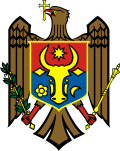- Moldovan presidential election, 2011
-
Moldova 
This article is part of the series:
Politics and government of
MoldovaConstitutionParliamentJudiciaryExecutiveDivisionsElectionsForeign policy
An indirect presidential election was to be held in Moldova on 18 November 2011, following the 2010 parliamentary election.[1]
Contents
Background
After the parliamentary election held on 5 April 2009, the PCRM won 49.48% of the vote and 60 seats, one seat too few to elect a President. Vladimir Voronin, up to then President, was elected Speaker of the Parliament and retained the Presidency of Moldova with an interim status. The police crackdown of the civil unrest in April 2009 antagonized the society, and the communists were unable to secure one additional vote at the May–June 2009 presidential election out of the 41 MPs from the three opposition parties; a snap parliamentary election was necessary.
In the snap parliamentary election in July 2009, the PCRM lost its parliamentary majority to a coalition of opposition parties which gained 53 seats. However, the opposition also failed to obtain enough seats to elect a President, thereby producing more uncertainty. Voronin announced on 2 September 2009 that he intended to resign, saying that his position as acting President had become "ambiguous and doubtful".[2] He resigned on 11 September 2009, [3][4] sending a letter to the Parliament secretariat.[5]
By a vote of 52 Mps, the post of the President of the Republic of Moldova was declared vacant. Therefore, in accordance with Article 91 of the Constitution of 1994, which provides that "the responsibility of the office shall devolve ad interim to the President of Parliament or the Prime Minister, in that order of priority", Mihai Ghimpu became the interim President of the Republic of Moldova.[6] The Constitutional Court of Moldova confirmed earlier on September 17, 2009 the legitimacy of Mihai Ghimpu's position as Acting President of Moldova, which gave him the right to nominate a prime minister. On the same day, Ghimpu signed a decree nominating Vlad Filat for the office of prime minister. The Commission for constitutional reform in Moldova was set up under presidential decree on December 1, 2009 in order to resolve the constitutional crisis. The post of Acting President passed later to Marian Lupu, who held it since 30 December 2010.
Calendarisation
Following an interrogation submitted by four deputies of the PCRM,[7] Moldova's Constitutional Court ruled on 8 February 2011 that the Parliament is the only institution which can decide when to hold a new presidential election, since the three-month deadline after the end of the mandate of the previous president, foreseen by the Moldovan Constitution, has already expired.[8]
On 20 October 2011 the Moldovan parliament decided to hold a presidential election on 18 November 2011.[9]
Candidatures
On 4 November 2011, three MPs of the Party of Communists of the Republic of Moldova defected, including former Prime Minister Zinaida Greceanii, thus making it virtually possible to break the impasse by reaching an agreement with the majority coalition, that lacks two votes to the election threshold.[10]
Nevertheless, on 15 November 2011 the deadline for candidates' applications expired with no applications provided.[11]
The country's laws do not make provision for a situation where there are no presidential candidates, but the elections are likely to be postponed or cancelled. Under Moldovan law, the presidential election can be repeated only once. If the second attempt fails, the country must hold early parliamentary elections.[12]
See also
- Acting President of Moldova
References
- ^ http://www.actmedia.eu/top+story/the+republic+of+moldova+%3A+marian+lupu,+the+chairman+of+the+parliament+and+the+interim+head+of+the+state,+and+vlad+filat+%96+premier+/31394
- ^ "Voronin Resigns As Acting Moldovan President", Radio Free Europe/Radio Liberty, 2 September 2009.
- ^ "Moldovan acting president resigns". Xinhua News Agency. 2009-09-11. http://news.xinhuanet.com/english/2009-09/11/content_12038359.htm. Retrieved 2009-09-13.
- ^ "Last stop: Moldova's former president resigns". The Sofia Echo. 2009-09-11. http://www.sofiaecho.com/2009/09/11/783284_last-stop-moldovas-former-president-resigns. Retrieved 2009-09-13.
- ^ "Moldovan president Vladimir Voronin resigns". The Star (Malaysia). 2009-09-11. http://thestar.com.my/news/story.asp?file=/2009/9/11/apworld/20090911172506&sec=apworld. Retrieved 2009-09-13.
- ^ "Moldova: Communists to End Rule". The New York Times. 2009-09-11. http://www.nytimes.com/2009/09/12/world/europe/12briefs-Moldova.html. Retrieved 2009-09-13.
- ^ http://constcourt.md/RO/05_activitate_jurisdictionala/sesizari/parvenite/2011/3b_24.01.2011.pdf
- ^ http://www.unimedia.info/?mod=news&id=29687
- ^ http://derstandard.at/1318726413341/Neuer-Anlauf-fuer-Praesidentenkuer
- ^ http://www.trust.org/trustlaw/news/moldova-defections-may-break-impasse-on-president
- ^ http://www.rbc.ru/rbcfreenews/20111115035441.shtml
- ^ RFE-RL, 16 November 2011
 Moldovan presidential elections
Moldovan presidential electionsDirect elections Indirect elections 2001 · 2005 · 2009 (May–Jun) · 2009 (Nov–Dec) · 2011
 Elections and referendums in Moldova
Elections and referendums in MoldovaParliamentary elections 1917 · 1940 · 1946 · 1950 · 1954 · 1958 · 1962 · 1966 · 1970 · 1974 · 1979 · 1984 · 1990 · 1994 · 1998 · 2001 · 2005 · 2009 (Apr) · 2009 (Jul) · 2010Local elections Presidential elections Referendums Alliance for European Integration Topics Parties Liberal Democratic Party of Moldova • Liberal Party (Moldova) • Democratic Party of Moldova • Party Alliance Our MoldovaCabinet PLDM MPs Filat • Tănase • Godea • Palihovici • Nagacevschi • Ţap • Vieru • Balan • Hotineanu • Leancă • Ghileţchi • Şleahtiţchi • Agache • Cimbriciuc • Furdui • Ioniţă • Streleţ • Butmălai • Ionaş • Ciobanu • OlaruPL MPs PD MPs AMN MPs Serafim Urechean • Veaceslav Untilă • Ion Pleşca • Leonid Bujor • Vasile Balan • Iurie Colesnic • Veaceslav Platon • Valentin ChepteniCojocaru
Commission

This Moldovan elections-related article is a stub. You can help Wikipedia by expanding it.
